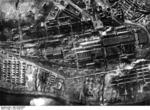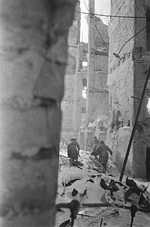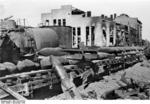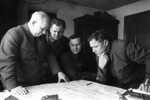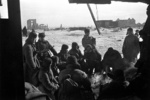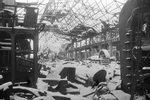14 Jul 1942
Russia
Russia
- Martial law was declared in Stalingrad, Russia. ww2dbase [Battle of Stalingrad | Stalingrad | AC]
23 Jul 1942
Russia
Russia
- Aleksandr Vasilevsky was named a representative of the Soviet Stavka at Stalingrad, Russia. ww2dbase [Aleksandr Vasilevsky | Stalingrad | CPC]
1 Aug 1942
Russia
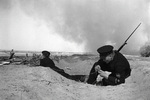
Russia
- Marshal Andrey Yeryomenko was appointed the commanding officer of the Soviet Southeastern Front, charged with planning the defense of Stalingrad in southern Russia. Meanwhile, German 4th Panzer Army attacked Kotelnikovo located 100 miles southwest of Stalingrad, surprising Soviet defenders. ww2dbase [Battle of Stalingrad | Stalingrad | CPC]

4 Aug 1942
Russia
Russia
- Elements of German 4.Panzerarmee crossed the Aksay River en route to Stalingrad, Russia. ww2dbase [Battle of Stalingrad | Stalingrad | TH]
6 Aug 1942
Russia
Russia
- Soviet fighter pilot Mikhail Baranov of the 183rd Air Regiment leading a flight of four Yak-1 aircraft over Stalingrad, Russia ran headlong into a formation of 25 Messerschmitt Bf 109 fighters and took them on, shooting down three before running out of ammunition. Then skilfully manoeuvring his aircraft on to the tail of a fourth Bf 109 fighter, he closed in and cut off the fin of the enemy fighter with his propeller, afterwards making a successful forced landing. ww2dbase [Yak-1 | Stalingrad | AC]
10 Aug 1942
Russia
Russia
- Troops of the German 6.Armee crossed the Don River in southern Russia, reaching the suburbs of Stalingrad. ww2dbase [Battle of Stalingrad | Stalingrad | TH]
16 Aug 1942
Russia
Russia
- German Luftwaffe conducted its first major bombing raid on Stalingrad, Russia. ww2dbase [Battle of Stalingrad | Stalingrad | CPC]
24 Aug 1942
Russia
Russia
- Marshal Georgy Zhukov was sent to Stalingrad, Russia to take over the defense. ww2dbase [Battle of Stalingrad | Stalingrad | TH]
3 Sep 1942
Russia
Russia
- The German 6.Armee and 4.Panzerarmee finally linked up near Stalingrad in southern Russia, but were rebuffed in their attempts to enter the city. ww2dbase [Battle of Stalingrad | Stalingrad | TH]
7 Sep 1942
Russia
Russia
- The German 6.Armee units began advancing through Stalingrad, Russia to the Volga shores. ww2dbase [Battle of Stalingrad | Stalingrad | TH]
11 Sep 1942
Russia
Russia
- Lieutenant General Vasiliy Chuikov took command of the newly formed Soviet 62nd Army located on the east bank of the Volga River at Stalingrad in southern Russia. ww2dbase [Battle of Stalingrad | Stalingrad | CPC]
12 Sep 1942
Russia
Russia
- General Friedrich Paulus began a fresh offensive toward Stalingrad, Russia with artillery and aerial bombardments. His ground troops then reached the strategically vital hill 102 of Mamayev Kurgan which overlooked the city. This hill, an important line of defence for centuries, would now see a bloody struggle by both sides as its loss would allow the Germans to control the entire river, across which all Soviet supplies had to travel. By the end of the day, the Soviet 62nd Army had been reduced to 90 tanks, 700 mortars and 20,000 men. ww2dbase [Friedrich Paulus | Battle of Stalingrad | Stalingrad | CPC, AC]
13 Sep 1942
Russia
Russia
- Lydia Litvyak shot down a German Ju 88 bomber and the Bf 109G-2 fighter piloted by Oberfeldwebel Erwin Meier over Stalingrad, Russia while flying a Yak-1 fighter. ww2dbase [Lydia Litvyak | Stalingrad | CPC]
14 Sep 1942
Russia
Russia
- Yekaterina Budanova claimed her first aerial kill, a Bf 109 fighter, over Stalingrad, Russia; the kill was shared with fellow pilot Lydia Litvyak. ww2dbase [Yekaterina Budanova | Stalingrad | CPC]
- Lydia Litvyak shot down a German Bf 109 fighter over Stalingrad, Russia while flying a Yak-1 fighter. ww2dbase [Lydia Litvyak | Stalingrad | CPC]
20 Sep 1942
Russia
Russia
- In Stalingrad, Russia, Soviet and German troops engaged in heavy fighting at the Mamayev Kurgan hill, in the Central Station, and the grain elevator. ww2dbase [Battle of Stalingrad | Stalingrad | CPC]
26 Sep 1942
Russia
Russia
- The German troops begin another "final" attack in Stalingrad, Russia. ww2dbase [Battle of Stalingrad | Stalingrad | TH]
27 Sep 1942
Russia
Russia
- Lydia Litvyak shot down a German Ju 88A-4 bomber and shared the credit for downing the Bf 109G-2 fighter piloted by Horst Loose over Stalingrad, Russia while flying a Yak-1 fighter. ww2dbase [Lydia Litvyak | Stalingrad | CPC]
- German Luftwaffe unit III./KG 4 (flying He 111 bombers) flew its last bombing sortie over Stalingrad, Russia. The unit would soon be transported out of its base in Morozovsk, Russia for Germany to undergo glider towing training. ww2dbase [Battle of Stalingrad | Stalingrad | CPC]
28 Sep 1942
Russia
Russia
- In Stalingrad, Russia, Sergeant Jacob Pavlov and three others assaulted the much shelled apartment block facing Solechnaya street, expelling the incumbent Germans with hand-grenades. In the cellar they found several badly wounded Soviet soldiers still holding out. "Pavlov's House" would become a boundary fortification, and a symbol of resistance. The handful of men defended the outpost for 58 days, against infantry, artillery and tank assaults. ww2dbase [Battle of Stalingrad | Stalingrad | AC]
2 Oct 1942
Russia


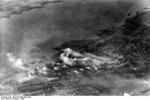
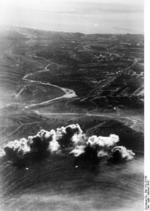
See all 2 Oct 1942 photos
Russia
- Yekaterina Budanova shot down a Ju 88 bomber and a Bf 109 fighter over Stalingrad, Russia. ww2dbase [Yekaterina Budanova | Stalingrad | CPC]




See all 2 Oct 1942 photos
3 Oct 1942
Russia
Russia
- Heavy losses were incurred on both sides as the German 6.Armee pushed the Soviet 62nd Army back to the Volga River at Stalingrad, Russia. ww2dbase [Battle of Stalingrad | Stalingrad | TH]
4 Oct 1942
Russia
Russia
- German XIV Panzer Korps attacked the Stalingrad Tractor Factory in Stalingrad, Russia. ww2dbase [Battle of Stalingrad | Stalingrad Tractor Factory | Stalingrad | TH]
6 Oct 1942
Russia
Russia
- Yekaterina Budanova shot down a Ju 88 bomber over Stalingrad, Russia. ww2dbase [Yekaterina Budanova | Stalingrad | CPC]
14 Oct 1942
Russia
Russia
- The German assault on the Stalingrad Tractor Factory in Stalingrad, Russia was aided by more than 2,000 sorties by aircraft of Luftflotte 4. ww2dbase [Stalingrad Tractor Factory | Battle of Stalingrad | Stalingrad | TH, CPC]
15 Oct 1942
Russia
Russia
- German Stuka dive bombers of Luftflotte 4 flew 900 individual sorties against Soviet positions at the Stalingrad Tractor Factory in Stalingrad, Russia, wiping out several Soviet regiments. ww2dbase [Battle of Stalingrad | Stalingrad Tractor Factory | Stalingrad | CPC]
22 Oct 1942
Russia
Russia
- Most of the Red October and Barricade factories in northern Stalingrad, Russia were taken by German troops. ww2dbase [Battle of Stalingrad | Stalingrad | TH]
25 Oct 1942
Russia
Russia
- Friedrich Paulus reported to Adolf Hitler that Stalingrad, Russia would be taken by 10 Nov 1942. ww2dbase [Battle of Stalingrad | Stalingrad | CPC]
11 Nov 1942
Russia
Russia
- German 6.Armee succeeded in reaching the Volga River in Stalingrad, Russia, with a 600-yard frontage near the Red October steel factory. In Germany, Hitler announced during Beer Hall Putsch celebration that Stalingrad, Russia was almost in German hands, but that he did not want to keep the city just because of its name. ww2dbase [Battle of Stalingrad | Stalingrad | TH]
19 Nov 1942
Russia
Russia
- Having fought the Germans to a standstill, the Soviets launched a surprise counter-attack north and south of Stalingrad, Russia designed to encircle Friedrich Paulus's German 6th Army bogged down in the city. ww2dbase [Battle of Stalingrad | Stalingrad | AC]
20 Nov 1942
Russia
Russia
- Six He 111 bombers of German Luftwaffe group KG 55 flew an armed reconnaissance mission from their base at Morozovskaya, Russia over Stalingrad, Russia; two aircraft failed to return. ww2dbase [Battle of Stalingrad | Stalingrad | CPC]
26 Nov 1942
Russia
Russia
- Low cloud ceiling of 200 meters and periodic snow showers hindered German ability to supply troops in Stalingrad, Russia on this day. ww2dbase [Battle of Stalingrad | Stalingrad | CPC]
3 Dec 1942
Russia
Russia
- In Stalingrad, Russia, after fierce hand-to–hand fighting, Soviet forces capture the L-shaped House where the Germans had been overlooking the Soviet positions along the Volga River for many weeks. ww2dbase [Battle of Stalingrad | Stalingrad | AC]
5 Dec 1942
Russia
Russia
- Despite heavy fog, 17 He 111 and about 50 Ju 52/3m aircraft were able to fly 150 tons of supplies into Stalingrad, Russia. ww2dbase [Battle of Stalingrad | Stalingrad | CPC]
24 Dec 1942
Russia
Russia
- Soviet troops launched an offensive against the German Armeegruppe Don near Stalingrad, Russia, piercing Romanian 4th Army's lines. ww2dbase [Battle of Stalingrad | Stalingrad | TH]
25 Dec 1942
Russia
Russia
- With the slaughter of over 12,000 horses, the Germans in Stalingrad, Russia received their last meat rations. ww2dbase [Battle of Stalingrad | Stalingrad | TH]
10 Jan 1943
Russia
Russia
- Another Soviet offensive, Operation Ring, began at Stalingrad, Russia. ww2dbase [Battle of Stalingrad | Stalingrad | TH]
18 Jan 1943
Russia
Russia
- Late in the day, three He 111 transport aircraft of German Luftwaffe unit III./KG 55 attempted to land at the small Gumrak Airfield at Stalingrad, Russia. The first landed but would not be able to takeoff again, the second made ten failed attempts at lining up with the wreck-strewn short runway but ultimately pushed its cargo of 20 sacks of bread out of the bomb bay doors without landing, and the third followed suit. ww2dbase [Battle of Stalingrad | Stalingrad | CPC]
22 Jan 1943
Russia
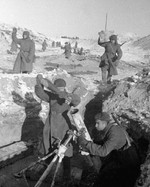
Russia
- German 6th Army engineers reported that the small Stalingradskaya Airfield close to the center of Stalingrad, Russia was ready to receive transport aircraft. Several He 111 aircraft arrived later on the same day with supplies, some of which would be fatally damaged when their landing gears became caught in bomb craters on the runway. ww2dbase [Battle of Stalingrad | Stalingrad | CPC]

23 Jan 1943
Russia
Russia
- The German-controlled Gumrak Airfield on the western side of Stalingrad, Russia was taken by Soviet troops. ww2dbase [Battle of Stalingrad | Stalingrad | TH, CPC]
24 Jan 1943
Russia
Russia
- The Soviets once again demanded surrender from the encircled German forces in Stalingrad, Russia. Responding to Friedrich Paulus' message requesting permission to surrender as his men were now nearly out of ammunition and medical supplies, Adolf Hitler told Paulus to fight to the last man even if defeat was imminent. By the end of this day, the German forces in Stalingrad would be divided in two pockets and would have lost the use of the final airstrip available to them, Stalingradsaya Airfield. ww2dbase [Battle of Stalingrad | Stalingrad | TH, CPC]
25 Jan 1943
Russia
Russia
- The remnants of the German 6.Armee were split in two pockets, north and south, in Stalingrad, Russia. ww2dbase [Battle of Stalingrad | Stalingrad | TH]
28 Jan 1943
Russia
Russia
- As the German forces in Stalingrad, Russia were now divided into three pockets by Soviet attacks, Hermann Göring messaged Friedrich Paulus, noting that Paulus' stubborn defense, even if it led to self sacrifice, would go down in German history as one of the most heroic tales. ww2dbase [Battle of Stalingrad | Stalingrad | CPC]
30 Jan 1943
Russia
Russia
- Soviet troops reached Red Square in central Stalingrad, Russia. ww2dbase [Battle of Stalingrad | Stalingrad | CPC]
31 Jan 1943
Russia
Russia
- Out of food and ammunition, the southern half of the German 6.Armee in Stalingrad, Russia surrendered; the final radio message coming out of this pocket was made at 1945 hours, which closed with the Morse abbreviation "CL", short for "Clear (I am closing my station)". Shortly after, 110 German transport aircraft take off for the northern pocket with supplies; more than 90 of the aircraft found the illuminated triangular drop zone and released their loads. ww2dbase [Battle of Stalingrad | Stalingrad | TH, CPC]
1 Feb 1943
Russia
Russia
- Trapped in the ruins of a department store in Stalingrad, Russia, Friedrich Paulus surrendered the southern pocket along with 14 of his generals; Paulus became the first German field marshal to surrender to an enemy force. Fighting continued in the northern pocket, however, and 85 of the 108 transport aircraft dispatched to airdrop supplies to the northern pocket were able to do so. ww2dbase [Battle of Stalingrad | Stalingrad | AC, CPC]
2 Feb 1943
Russia


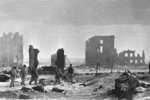
Russia
- The last of the German Sixth Army surrendered in Stalingrad, Russia. On the same day, a German reconnaissance aircraft was dispatched to fly over Stalingrad, confirming that all fighting had ceased. ww2dbase [Battle of Stalingrad | Stalingrad | TH]



3 Feb 1943
Russia
Russia
- 12 He 111 aircraft, with supplies on board, flew over the northern pocket of Stalingrad, Russia before dawn. Of the 11 aircraft that reached the intended drop zone, only 3 dropped some of their cargo, as they found no German activity. ww2dbase [Battle of Stalingrad | Stalingrad | CPC]
18 Jun 1954
Russia
Russia
- Karl von Le Suire passed away at a prisoner of war camp in Stalingrad, Russia. ww2dbase [Karl von Le Suire | Stalingrad | CPC]
Please consider supporting us on Patreon. Even $1 per month will go a long way! Thank you. Please help us spread the word: Stay updated with WW2DB: |
Change View
Desktop ViewSearch WW2DB

News
- » Wreck of Teruzuki Found (27 Jul 2025)
- » USS Orlean's Bow Found (22 Jul 2025)
- » The Emperor of Japan Planned to Honor WW2-era Japanese POWs in Mongolia (4 Jul 2025)
- » US State Lawmaker John Winter Caught Using Racial Slur "Jap" and Apologized (11 Jun 2025)
- » US Government Plans to Purge WW2 Information (17 Mar 2025)
- » See all news
Random Photograph
Lyudmila Pavlichenko posing with her SVT-40 sniper rifle for a publicity photo shoot, 1942Current Site Statistics
- » 1,181 biographies
- » 337 events
- » 45,111 timeline entries
- » 1,246 ships
- » 350 aircraft models
- » 207 vehicle models
- » 376 weapon models
- » 123 historical documents
- » 261 facilities
- » 470 book reviews
- » 28,471 photos
- » 365 maps
Famous WW2 Quote
"Since peace is now beyond hope, we can but fight to the end."Chiang Kaishek, 31 Jul 1937


